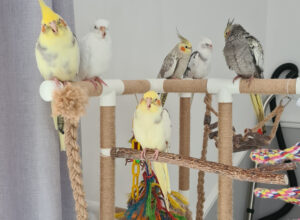Creating a Safe Cockatiel Environment
Key Takeaways
- Understanding Cockatiel Needs: Learn the essentials of creating a safe and nurturing environment for your cockatiel.
- Cage Setup and Maintenance: Tips on setting up the perfect cage and maintaining cleanliness.
- Diet and Health: Insights into a balanced diet and recognising health issues.
- Behaviour and Social Needs: Understanding and catering to your cockatiel’s behavioural and social requirements.
- Seasonal Care and Emergency Preparedness: How to adapt care with changing seasons and what to do in emergencies.
Everyone should understand the importance of creating a safe and comfortable environment for these special birds. Cockatiels, with their playful nature and endearing personalities, require a well-thought-out habitat to thrive. This article will guide you through the essentials of crafting a haven for your feathered friend, ensuring their health, happiness, and longevity.
Understanding Your Cockatiel
Before diving into the specifics of their care, it’s crucial to understand cockatiel behaviour and needs. Cockatiels are social, intelligent birds that crave interaction and mental stimulation. They are also sensitive to their environment, making it vital to provide a space that caters to their physical and emotional well-being. For a deeper understanding, visit Understanding Cockatiel Behaviour.
The Ideal Cage Setup
A safe and comfortable cage is the cornerstone of your cockatiel’s environment. Here’s how to set it up:
Choosing the Right Cage
- Size: Ensure it’s spacious enough for your bird to flap its wings and move around freely. For a single bird, we recommend a minimum cage size of 60cm x 45cm x 60cm
- Bar Spacing: Opt for bars spaced no more than 1.5 cm apart to prevent escape or injury.
Essential Cage Accessories
- Perches: Provide a variety of perches of different materials and diameters. Learn more about choosing the right perches at Choosing Cockatiel Perches.
- Food and Water Dishes: Place them at a comfortable height and keep them clean.
- Toys: Include a range of toys for mental stimulation and play.
For detailed guidance on setting up your cockatiel’s cage, visit Setting Up Cockatiel Cage.
Feeding Your Cockatiel
A balanced diet is crucial for your cockatiel’s health. Here’s a basic guide:
| Food Type | Examples |
|---|---|
| Pellets | Formulated cockatiel pellets |
| Fresh Fruits & Veggies | Apples, carrots, leafy greens (see Safe Fruits & Veggies for Cockatiels) |
| Treats | Occasional seeds or nuts (learn about Healthy Cockatiel Treats) |
For more on cockatiel feeding, explore Cockatiel Feeding Basics.
Daily and Seasonal Care
Daily Care
- Cleanliness: Regularly clean the cage and accessories. For tips, visit Cockatiel Cage Cleaning.
- Water: Always provide fresh water. Understand their hydration needs at Cockatiel Hydration Needs.
- Interaction: Spend time daily interacting with your cockatiel.
Seasonal Adjustments
- Summer: Ensure adequate shade and ventilation.
- Winter: Provide a warm, draft-free environment.
For more on seasonal care, see Seasonal Cockatiel Care.
Health and Veterinary Care
Regular health checks are vital. Be aware of signs of illness and have a vet experienced with birds. For more on identifying illnesses, visit Identifying Cockatiel Illnesses. Also, understand the importance of regular veterinary visits at Cockatiel Veterinary Care.
Behavioural Aspects and Social Needs
Cockatiels are social creatures and require interaction and mental stimulation. Understanding their communication is key to a happy relationship. Learn more at Basics of Cockatiel Communication.
Preventing Boredom
- Toys: Rotate and replace toys regularly to keep them interesting.
- Playtime: Dedicate time for play and exploration outside the cage.
For more on playtime, see Importance of Cockatiel Playtime.
Grooming and Exercise
Regular grooming and exercise are essential for your cockatiel’s well-being.
| Activity | Description |
|---|---|
| Wing Clipping | Optional. Some do this for safety. Personally, I don’t clip my birds’ wings. But I have a completely bird-safe environment where they’re less at-risk of flying injuries. |
| Nail Trimming | Prevent overgrowth and injury. |
| Bathing | Provide opportunities for bathing or misting. |
For grooming essentials, visit Cockatiel Grooming Essentials. Exercise and play are also crucial, as detailed in Cockatiel Exercise & Play.
Emergency Care and Travel
Be prepared for emergencies and understand how to handle your cockatiel safely during travel. For emergency care tips, visit Emergency Care for Cockatiels. For travel advice, see Travelling with Cockatiel.
Conclusion
Creating a safe environment for your cockatiel involves understanding their needs, providing a well-equipped cage, maintaining a balanced diet, and ensuring regular health checks. Remember, a happy cockatiel is a healthy cockatiel. Embrace the journey of caring for these delightful birds, and you’ll be rewarded with their affection and companionship for years to come.
“The joy of keeping a cockatiel is not just in its beauty but in the bond you create through understanding and care.”

